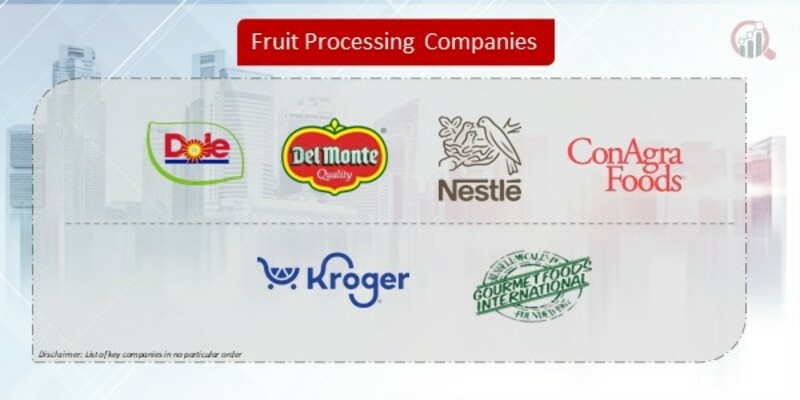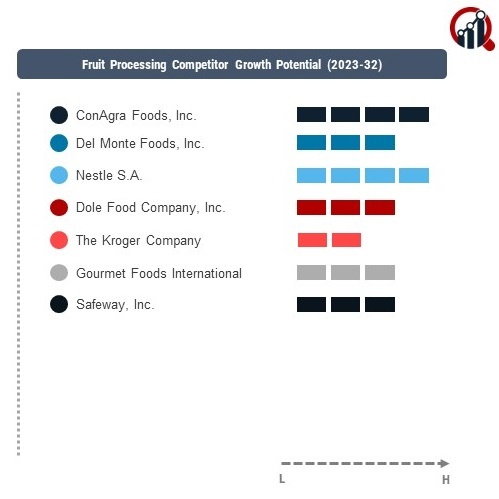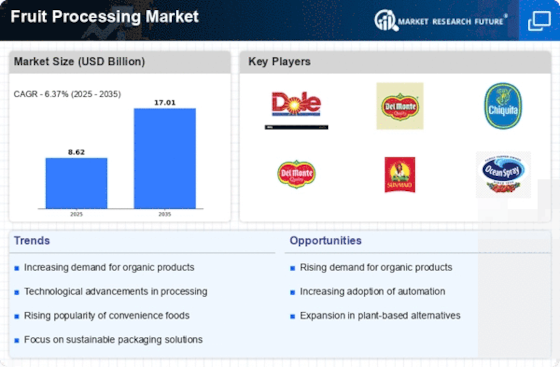Top Industry Leaders in the Fruit Processing Market

The Fruit Processing Market is a dynamic segment within the food industry, encompassing various players contributing to the processing and distribution of fruit-based products. An analysis of the competitive landscape involves an examination of key players, their strategies, market share determinants, emerging entities, industry news, ongoing investment trends, and the overall competitive scenario. This review provides insights into the major players, their strategies, key market share factors, recent developments, and the overarching dynamics of the Fruit Processing Market as of 2023.
Key Players:
Safeway Inc. (US)
Gourmet Foods International (US)
The Kroger Company (US)
Dole Food Company Inc. (US)
Nestle S.A. (Switzerland)
Del Monte Foods Inc. (Singapore)
ConAgra Foods Inc. (US)
Strategies Adopted:
Strategies adopted by key players in the Fruit Processing Market revolve around vertical integration, product diversification, sustainable sourcing, and technological innovation. Vertical integration is a key strategy as companies aim to control various stages of the supply chain, from sourcing raw fruits to processing and distributing finished products. This ensures efficiency and quality control.
Product diversification is another significant strategy, with companies expanding their product portfolios to include a wide range of fruit-based products such as juices, purees, concentrates, and frozen fruits. Offering diverse products allows companies to cater to various consumer preferences and market segments, enhancing their competitive edge.
Sustainable sourcing is increasingly becoming a focal point for companies in response to growing consumer demand for ethically and environmentally sourced ingredients. Key players emphasize responsible and sustainable sourcing practices, including supporting local farmers and adopting eco-friendly cultivation methods.
Technological innovation plays a crucial role in improving processing efficiency and product quality. Key players invest in advanced processing technologies, such as aseptic processing and cold-chain logistics, to ensure that fruits maintain their freshness and nutritional value throughout the processing stages.
Market Share Analysis:
The Fruit Processing Market is influenced by factors such as processing efficiency, supply chain robustness, product quality, and brand reputation. Companies that implement advanced processing technologies ensuring high efficiency gain a competitive advantage, leading to increased market share.
Supply chain robustness is crucial for companies to maintain a steady and reliable supply of raw fruits. Key players often establish strong relationships with fruit farmers, cooperatives, and suppliers to ensure a consistent supply of high-quality fruits, contributing to market share growth.
Product quality is a paramount factor in market share analysis. Companies that adhere to stringent quality control measures and implement best practices in fruit processing maintain consumer trust and satisfaction, leading to an expanded market share.
Brand reputation plays a vital role in influencing market share. Companies with a strong and positive brand image, built on reliability, transparency, and product consistency, are more likely to capture a larger share of the market.
News & Emerging Companies:
The Fruit Processing Market often revolves around advancements in processing technologies, partnerships, and mergers and acquisitions. Emerging companies in the sector typically focus on niche areas, such as organic or exotic fruits, or innovative processing techniques to gain a foothold in the market.
Industry news also highlights collaborations between key players and research institutions to explore new processing methods or introduce unique fruit products to the market. Emerging companies contribute to the market's dynamism by introducing novel approaches and solutions.
Industry Trends:
The Fruit Processing Market emphasize research and development, sustainability, and technology adoption. Companies invest in developing new processing technologies to enhance efficiency, reduce waste, and improve the overall sustainability of fruit processing operations.
Sustainability remains a key investment trend, with companies exploring eco-friendly packaging solutions, adopting energy-efficient processing methods, and supporting fair trade practices. Investments in sustainable practices align with consumer expectations for environmentally responsible business operations.
Technological adoption focuses on implementing state-of-the-art processing equipment and techniques to improve productivity and product quality. Investments in automation and data analytics contribute to the optimization of processing operations, enabling companies to stay competitive.
Competitive Scenario:
The Fruit Processing Market is characterized by intense competition among key players who balance technological innovation, sustainability, and market responsiveness. Established players leverage their global presence and extensive resources, while emerging companies contribute to market diversity and innovation.
The versatility of fruit-based products allows companies to adapt to evolving consumer preferences, creating a competitive environment where those who efficiently respond to market demands and consistently deliver high-quality products are well-positioned for success.
Recent Development
The Fruit Processing Market was the increased focus on organic and clean-label products. Key players responded to growing consumer demand for natural and minimally processed fruit products by introducing organic fruit juices, purees, and frozen fruits. This development aligns with the broader industry trend towards healthier and more transparent food options, reflecting the growing importance of health-conscious consumer preferences in shaping market strategies.











